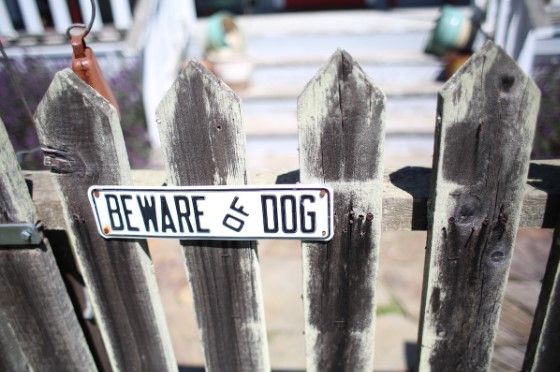What To Do If You’re Bitten By a Dog
The number of dogs in the US has steadily increased over the past two decades: roughly half of US households now own a dog. With that number of dogs living amongst humans, it’s more common than you think for someone to suffer a dog bite. This might sound frightening, but statistics show dog bite incidents have decreased over the years.
Certain breeds have a reputation for being more aggressive or biting more often, but a study by the American Veterinary Medical Association shows this is unlikely. Instead, the AVMA suggests that a better way to decrease dog bites is to enforce “non-breed-specific dangerous dog laws, with an emphasis on chronically irresponsible owners,” and prohibit dog fighting, among other things.
Laws and breeds notwithstanding, dogs are still animals and can lash out if frightened. Even if dog bites are not as common as we fear, it is still essential to be mindful of the risk and be cautious around dogs we don’t know. Ask to pet any unfamiliar dogs and respect the owner’s answer.
It is equally important to have a plan of action if an injury occurs, including first aid and contacting a lawyer if a dog bite is severe. Knowing what action you can take following a bite, including hiring a dog bite lawyer, can help ease anxiety or fear in the moment.
Here are steps you can take following a dog bite:
When a Dog Bite Occurs
If someone is bitten, stay calm and get some distance from the dog. Dog bites can be painful and scary, especially for children, but it’s important to remain level-headed. Most dogs won’t bite unless they’re agitated or stressed, so it’s good to give the dog some space to calm down; this will also help prevent further injury.
It is crucial to get medical attention if needed, but “it doesn’t necessarily have to be that second, minute or even within an hour” says Dr. Drigalla, an emergency medicine physician. You have some time to assess the situation calmly and apply first aid.
Medical attention is still essential in many cases, so Dr. Drigalla also says that “waiting a couple of days is a bad idea.” We’ll go over more details about seeing a medical professional shortly.
Clean Wound and Apply First Aid
As a first step, when a dog bite occurs, you will need to check the bite itself. Ensure your hands are clean before handling the wound, and check if it’s actively bleeding. If it is, apply pressure with a clean cloth, gauze, or tissue, and hold it there until the bleeding stops.
If there is no active bleeding, or when the bleeding has stopped, make sure to clean the wound with mild soap and water. It is also recommended that you rinse the wound with warm water for several minutes.
After cleaning the bite, apply antibiotic cream if at all possible. It might not be necessary for all scrapes and cuts, but it is vital for dog bites. The University of Rochester Medical Center says to apply it if the wound is dirty because of the bacteria in a dog’s mouth that can be introduced if the skin is broken. If you don’t have antibiotic cream, follow the rest of the first aid steps and keep the wound clean.
Finally, apply a clean bandage, and change it if it gets dirty or wet.
Get Information From the Dog Owner
You will need to get information from the owner (if possible) when a dog bite occurs. The AVMA recommends that you:
- Request proof of rabies vaccination
- Get the owner’s name and contact information
- Contact the dog’s veterinarian to check vaccination records
Your doctor will want this information so they can decide how to proceed with treatment. This information can also be important if the injury is severe and you need advice from a lawyer, which we will cover later.
If the dog is a stray or the owner is not nearby, consider calling your local animal control to ask for advice. They may want more information about the situation.
See a Medical Professional
The next step is to seek medical attention. You are encouraged to see your provider or visit a walk-in clinic, even if the wound isn’t severe, due to the risk of infection. If you have diabetes or are immunocompromised, that risk of infection is even higher.
The Cleveland Clinic states, “Roughly half of dog bites introduce bacteria, including staphylococcus, streptococcus, and pasteurella, as well as capnocytophaga.” A tetanus infection can also be a concern, so you may need a booster if you haven’t had a tetanus shot within five years.
Of course, another consideration is rabies. Mandatory dog vaccination programs have lowered the chance of rabies – only around 60 to 70 dogsare reported rabid in the US each year – but the disease is fatal if contracted and is not worth leaving up to chance. After a potential exposure, washing and thoroughly rinsing the wound is vital, but you will still need to see a medical professional for further treatment.
Contact a Personal Attorney if Necessary
Finally, consider contacting a personal injury attorney. If you aren’t sure if you have a case, the attorneys at Warren Allen clarify: “If you were injured in an accident and you were found not to be at fault, you have a case for personal injury.”
Of course, taking legal action is not always necessary, but you can always seek advice from a lawyer regarding a dog bite. Keep track of details of the incident, such as the dog owner’s information, and record your injuries and recovery via writing or photos. An attorney may be able to help you receive compensation, so reach out to Warren Allen today and let us help you!

